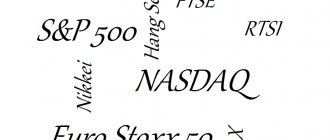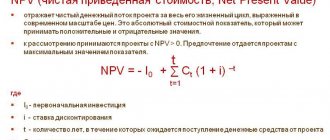Despite the fact that every year a huge number of different financial instruments appear that allow investors to make a profit, the majority of the population is in no hurry to take advantage of them. And they prefer to invest money the old fashioned way, namely in bank deposits. There are, of course, many reasons for this, but the most important one is the financial illiteracy of the population.
Due to a lack of financial knowledge, most Russians consider bank deposits to be almost the only way to make a profit on their investments. Of course, this cannot be said to be wrong. The main thing here is that this choice was conscious. If you have chosen a bank and opened a deposit with it, then I would like to believe that you have made the right choice in accordance with your financial goals. Those. you didn’t go to the first bank you came across, guided by the criterion of proximity to home, but analyzed the offers of various banks and chose the most profitable deposits with maximum rates.
Or you chose bank deposits consciously, and not out of ignorance of other investment options.
A competent investor, when opening bank deposits, pursues a number of reasons: guaranteed profitability for a predetermined period. At the same time, he understands that he will not use this money during the entire term of the deposit for any other purposes. An illiterate investor invests money mainly so that it does not lie at home like a dead weight, without exactly knowing how long to invest it and when he might need it. Therefore, there are often cases when, having opened a deposit for a period of 1 year, after 6-9 months, such would-be investors urgently need money and have no choice but to withdraw it from the account, losing all the accrued interest.
The results of surveys conducted annually show that approximately 80-85% of all bank clients prefer to work with one or two banks (keep money with them). Although approximately two-thirds of them periodically look for more favorable offers from other banks, as a rule, they do not make any further moves to change bank deposits to more profitable ones.
And only about 10% regularly change banks, based on the criterion of higher deposit rates.
Why do the majority of the population use the services of banks to store and increase funds?
There are several reasons for this.
What is a deposit?
A deposit is money or shares that individuals or legal entities transfer to a bank to earn income at a certain interest rate. The interest accrued on the deposit amount is issued by the bank, which acts as a financial intermediary between depositors and those who borrow money. The operating algorithm of the banking institution itself is simple:
- A banking organization attracts funds to accounts from individuals and legal entities.
- The bank then invests these funds in various projects with conditions of urgency, repayment and repayment.
- The banking organization then gives part of the profit in the form of interest to the persons who invested the funds in deposit accounts.
If the state has a stable economy, then investing money in a bank deposit account is the least profitable way to receive income compared to various investments, but it is not risky.
How do deposit programs differ from deposit programs?
Deposits are programs available exclusively to individuals. But deposits are more often used by enterprises and law firms with various forms of ownership. This difference can be called the most important.
The Russian Federation Law “On Banks and Banking Activities” regulates both areas.
Deposits can be made only in officially registered legal associations that legally operate in the territory of the state. But when working with deposits, the picture is completely different. Agreements for such placement of funds can be drawn up in absolutely any type of banking and financial institutions. Another important difference.
Deposits involve the use of exclusively foreign currency. And on deposits you can place securities, precious metals, and so on.
Finally, deposit accounts are opened temporarily. Deposits have much longer contract periods.
Types of deposits
There are several types of deposits. They are mainly divided into two groups: urgent and “on demand”.
Time deposits are deposits that have a certain validity period. By timing they are divided into:
- long-term – when the deposit period is more than 12 months;
- medium-term – 3–12 months;
- short-term – 1–3 months.
Time deposits have their own differences - a higher interest rate, but the inability to withdraw money ahead of time without losing interest, permission or prohibition to replenish the account depends on specific conditions. Term deposits are also divided into:
- savings – withdrawing and depositing money is prohibited for a certain period;
- cumulative - you can’t shoot, you can report;
- settlement – you can perform any types of operations.
A demand deposit always has lower interest rates, since it involves simple storage of funds. But you can pick them up at any time. It is also possible to transfer money from such deposits to the account of another person, cash out and withdraw through a cash register or ATM.
How to make money on OFZ: a case study
There’s no need to talk much about how to make money on a deposit: set it and forget it. And then they received the money with interest. By the way, in some cases, interest can be withdrawn even monthly - it all depends on the specific conditions of the bank.
What is OFZ in simple words
The principle of generating income from OFZs is approximately the same. OFZ are federal loan bonds. Simply put: these are debt securities of the state of the Russian Federation. When you purchase them, you borrow an amount and then receive interest payments (called coupons in this case). Today (December 2021) the average yield is 6-7%, sometimes 8-9% per annum.
The nominal value of the bonds is 1,000 rubles per share. But in reality they can be bought at a price higher or even lower than this amount: it all depends on market conditions. For example, during 2021, the Central Bank consistently reduced the refinancing rate from 7.25% to 6.25% (as of December 31, 2019),
Therefore, the market value of bonds has decreased. And this was an advantageous moment for buying securities - which means that you can and should make money on this too. However, there is another source of income - a tax deduction. I'll tell you about it right now.
3 sources of income from OFZ
So, let's summarize the first results. Thanks to bonds we can earn at least 3 times:
- Payments on coupons (let's say 6-7% per annum) - they are credited to the account every 6 months.
- Selling at a higher price - here we will make money on the difference.
- Receiving a tax deduction.
The deduction can only be received if you have opened an individual investment account (IIA). You can invest no more than 1 million rubles a year there, which is quite suitable for novice investors. The beauty is that thanks to the account you can get a deduction (1 to choose from):
- Type A: 13% of the deposited amount due to the return of previously withheld personal income tax from salary or other income. The maximum you can receive is 52,000 rubles per year.
- Type B: exemption from personal income tax on all income received from investment.
It is important to make a reservation here: if you only receive coupon income on bonds, you do not need to pay tax in any case (even without a deduction). But if you make money on the difference between the sale and purchase prices, income tax will be withheld from you. This is where the Type B deduction comes in handy: it exempts you from 13% personal income tax.
Note!
Both types of deductions can be used only if the IIS will exist for at least 3 years. Moreover, you can change the deduction only after closing one account and opening a new one.
Example of real bond income
So, let’s assume that you have opened an individual investment account and invest 400 thousand annually, and invest the entire amount in bonds. Let's say you bought a total of 1,200 OFZs, and at a price slightly lower than the face value - 990 rubles per 1 piece. The coupon rate is 7% per annum.
For each year you were given a deduction from the invested amount - 13% of 400 thousand, i.e. 52,000 rubles each. Then you sold the bonds for 1000 rubles - i.e. at par and earned 10 rubles from each unit. Let's calculate the total profit for 3 years (in net terms):
- Tax deduction for 3 years: 52,000 rubles * 3 = 156,000.
- Yield on coupon 7% per annum from 1 million 200 thousand = 84,000 rubles.
- Profit from selling at a higher price: 10 rubles from 1 piece - a total of 12,000 rubles.
In total, over 3 years we will earn 252,000, i.e. in terms of 1 year, this is 84 thousand or 21% per annum. Of course, in fact, we will have to give 13% of the profit when selling securities, i.e. 13% of 12000 = 1560 rub. And also pay a commission to the broker - it depends on the terms of the contract, but in any case it is a small amount, let’s say 1% of the profit: 2520 rubles. Our total costs are 1560 + 2520 = 4080 rubles.
It turns out that 252,000 – 4080 = 247,920 rubles. This means the yield is 20.67% per annum. Actually, I made this detailed calculation so that you yourself can understand what is more profitable: OFZ or deposit. Deposits lose, if only because the rate on them is slightly lower than on bonds. In addition, the deposit cannot receive either a deduction or profit from the difference between the sale and purchase prices. However, OFZs also have their drawbacks. Let's look at all the pros and cons in order to make an objective, and most importantly, profitable decision.
The principle of calculating interest on a deposit
Most often, when calculating interest, the principle of a single period is applied. This means that interest at the stipulated rate will be accrued at the end of the period specified in the contract, and not monthly. It works like this:
- Deposit for a year. The client deposited 40,000 into a deposit account at an interest rate of 6% per annum. In a year he will receive 42,800 rubles. Income for the year will be 2,400.
- Investment for several months. In this case, interest is calculated for a certain number of months. In our case, 6%: 12 months and multiplied by 6 months (if the deposit is for six months). As a result, the investor will receive 41,200 rubles. Income – 1,200.
- Deposit for 1 month. Annual interest in this situation is calculated for 1 month. 6%: 12 months. = 0.5%. 40,000 x 0.5% = 200 rubles.
Important!
There are banking offers in which interest is accrued not once a year, but once every six months or quarterly.
OFZ or deposit: pros and cons
So, let's try to evaluate the advantages and disadvantages of bonds and compare them with the conditions for bank deposits.
Pros of OFZ
There are a lot of advantages to this method of saving – judge for yourself:
- If a maximum of 1.4 million is insured on a bank deposit, then you can invest much more in bonds: there is practically no risk of loss.
- Bond rates are definitely not lower than bank deposits, and in some cases even higher: 6-7% per annum or more.
- You can make money on OFZs if you buy them below par and sell them at a higher price. Of course, this income is not guaranteed, but it is not excluded.
- When purchasing bonds, you are guaranteed to receive a tax deduction - and this is an additional 13% per annum, which does not hurt at all.
- Thanks to bonds with an indexed par value of OFZ-IN, you receive a kind of insurance against inflation. The value of these assets is revised monthly in accordance with the consumer price index. There is no such option for deposits.
- Bonds can always be closed early, and you will not lose the accumulated coupon income. In most cases, this option is not available for deposits.
- With debt securities, you receive coupon income every six months. It is immediately transferred to your account, i.e. You don’t need to close an IIS or a brokerage deposit for this - you just receive the money and manage it at your own discretion.
- Finally, the coupon payments received can be reinvested in OFZs and receive even greater profits. Those. it’s like a replenishable deposit - banks rarely offer such an opportunity.
Do this!
Since coupon income from bonds arrives every six months, you can specifically purchase several issues in order to receive passive income each month.
Disadvantages of OFZ
Do bonds have disadvantages? Of course, there are simply no perfect investments. True, there are few of them:
- It is not always possible to purchase OFZs at par value; they can cost more. But they are redeemed at par value - so you better try to buy these securities as cheaply as possible.
- If an extreme economic or foreign policy situation occurs, the price of government bonds may drop significantly. For example, in 2014, against the backdrop of well-known events, assets lost 30-40% of their nominal value, i.e. cost 1000, but now cost 600-700 rubles. This was the only case in the last 10 years. Moreover, coupon payments went on schedule even in 2014.
- If you purchased OFZ on an IIS, then you can withdraw all profit from the account only after it is closed (this does not apply to coupon income - it can be withdrawn every 6 months).
- If you close your IIS before the end of 3 years, you will lose the right to a tax deduction. And all previously received payments from the tax office will have to be returned with penalties. But this is more likely a drawback of the account itself than of the bonds themselves.
- The coupon rate is not always known in advance; for some securities it may change every 6 months.
Note!
You can also purchase government bonds at a bank branch (we are talking about national OFZ-n). In this case, you are guaranteed to buy and redeem them at par, and also receive a coupon income that is known in advance.
Pros and cons of deposit
Actually, the advantage of the deposit is its simplicity. They deposited the money and withdrew the interest in 6-12-18-24 months. If the amount is less than 1.4 million, you can relax, because it will be returned to you in any case. But this method of saving also has disadvantages:
- rates are on average lower than government bond coupons;
- investing large sums is risky;
- there is no way to make money on the difference when selling an asset at a higher price;
- no tax deduction is provided;
- It will not be possible to withdraw profits every 6 months (although there are exceptions).
It turns out that all the advantages of bonds are at the same time the disadvantages of a bank deposit. And since deposit rates have really begun to decline recently, many investors without thinking twice began to buy debt securities.
Comparison table
So, let’s compare which is better – OFZ or deposit. All the pros and cons are clearly described in the table.
| compared parameter | OFZ | bank deposit |
| profitability | 6-8% per annum | up to 6-6.5% per annum |
| tax deduction | Yes | No |
| profit from selling at a higher price | Yes | No |
| early repayment without loss | Yes | No |
| partial replenishment (reinvestment) | Yes | No |
| receiving income every month/every six months | Yes | No |
| insurance | absent | up to 1.4 million rubles |
| reliability | higher | below |
| risk of denomination drawdown | There is | No |
Deposits with interest capitalization
Many banks offer deposits with interest capitalization. These are deposits where, after the expiration of the main term, the accrued interest is added to the main deposit, and in the next deposit period interest is accrued on a different amount.
Reference!
For example, a client deposited 50 thousand rubles in the bank at 8% per annum. In a year, the amount in the account will be 50 thousand + 8% = 54,000 rubles. In another year, the amount will be equal to 54,000 + 8% = 58,320 rubles. This is the most profitable deposit option for accumulating funds and generating income.
There are also deposits with monthly capitalization. In such offers the income is more significant.
What else do you need to know about bank deposits?
In order not to encounter troubles related to deposits, it is recommended that you familiarize yourself with useful tips from experts in this field.
- You should not focus solely on the deposit percentage. Typically, when advertising, banks focus exclusively on the rate and talk about profitability. However, they do not mention anything about the remaining conditions. As a result, many people believe that percentage is the most important thing, although this is not the case. The size of the bet is one of the parameters that should be assessed by a person along with others: the reliability of the bank, the ease of managing the deposit, the guarantees provided. In addition, you should know that interest is calculated in different ways - it has a certain scheme, which you also need to familiarize yourself with.
- It is recommended to pay attention to deadlines. The basic rule is this: the longer the deposit is open, the higher its profitability. Therefore, people usually agree to deposits from a year. However, you shouldn't always do this. You need to remember that savings may be needed at any time. Of course, it is allowed to withdraw money from the annual deposit, but then the client will not receive any income.
- It is worth reading the deposit agreement very carefully. If all the conditions are clear and clearly described, and the written agreement itself does not consist of dozens of pages, then you can safely sign it.
When selecting a bank, you should also take into account the following fact - when a person has been a client of a financial institution for a long time, he is offered special conditions for deposits. To find out more about possible preferences, you will need to contact the support service of a particular bank.
Is tax charged on deposit income?
Interest accrued on deposits is passive income, so many investors have a question about whether they need to pay tax on such income. This is regulated by Art. 214.2 of the Tax Code of the Russian Federation. According to this law, everything depends on the interest rate.
Important!
The tax will not have to be paid if the interest rate is not greater than the specified Central Bank refinancing rate plus 5%. This means that if the Central Bank refinancing rate is, for example, 7%, then income from deposits up to 12% per annum is not taxed. If the bank offers 13% per annum, you need to pay tax when receiving income from the deposit in the form of interest. But you will not have to pay the entire amount of interest, but only the difference. In the case we are considering with 1% per annum. This means that if a depositor has 40 thousand in his account at 13%, then only 400 rubles are taxed.
But the depositor does not need to worry about paying tax obligations, since according to the law, the tax agent, who in this situation is the bank itself, must think about this.
Is it profitable to put money on deposit: pros and cons
- Advantages of a deposit
Firstly, the money is reliably protected by the bank. Even if something happens to them, you do not risk your funds, because all deposits are insured and will be returned to you in full (up to 1 million 400 thousand rubles). Secondly, you earn income without essentially doing anything: the money itself works for you. If you do not understand investments and do not own a business, but you have a certain amount of money that needs to be saved, then putting money on deposit is profitable.
- Disadvantages of a deposit
Despite the fact that deposits are a reliable way to save and increase funds, they have a number of features that you need to know about.
- Inflation is always higher than the interest charged by the bank. Over time, interest yields less profit. The solution is to make not too long-term investments.
- Possibility of bank bankruptcy and, as a consequence, lack of expected profit.
- Their liquidity is low. Having put money on deposit, you cannot fully manage it due to the restrictive terms of the contract.
Overall, a deposit is a great way to save your money while earning a little money. But if you have a goal to make a profitable investment and get serious income, then it is better not to put money in the bank, but to choose some other method.
Bank selection
Any depositor is interested in the maximum income that will be received from the funds stored in the bank. When choosing a bank, you need to pay attention to several main criteria:
- Reliability. First of all, it is important to ensure that the selected financial institution participates in the state deposit insurance program. In this case, a deposit of up to 1.4 million rubles will be returned under the state insurance program if the bank becomes bankrupt. Reliability is also influenced by such parameters as: profitability, value of assets, liquidity. To avoid mistakes, it is better to use data from rating companies that constantly monitor the situation in the banking market.
- Network of branches and ATMs. This is necessary for those who plan to withdraw money or top up their account. It is important that the branch of the selected bank is in a specific city and has a developed ATM network.
When choosing a bank, you should also evaluate the variety of types of deposits offered. This will make it easier to choose the most suitable one. Large banking organizations always have many interesting offers available with different terms, interest rates and other conditions.
Deposit and current account: differences and differences
People often face the choice of which account to open: deposit or current. In order not to make a mistake with your choice and further actions, you need to clearly understand the difference between these two accounts.
- A bank deposit is subject to certain conditions that are specified in the banking service agreement. The essence of use comes down to the fact that a person gives money to extract additional passive profit.
- A current account is opened to make it easier to work with your money. It is something like an electronic wallet, in which the bank acts as an intermediary and carries out all instructions related to maintaining an account.
The main differences between a deposit and a current account:
- Validity. It opens for a strictly defined time, and the current one can work indefinitely.
- Purpose of use. The main beneficiary in the first case is the client (since interest is paid), and in the case of the current one, the bank (since it is he who receives the commission).
- Possibilities. The client can use the resources of the current account at any time when he needs to transfer payment to a supplier or withdraw cash. But the bank manages the funds of the deposit account for its own purposes, meanwhile paying the client interest on the profit received.
This is how you can briefly describe the differences between the two types of accounts. And if you can do without a deposit, then many individuals have a current account, not to mention legal entities, where the bank is the official representative of their financial interests.
Selecting a deposit
After choosing a bank, you should decide on a specific investment program. To do this, you should carefully study the terms of deposits:
- Interest rate. All investors dream of a large interest rate. High interest rates can be justified by the fact that the bank urgently needs to increase its assets, carry out various promotions, as well as the need to attract new regular customers. It is important to find out whether this type of deposit has a fixed or floating interest rate. The fixed rate does not change, but the floating interest rate can change during the period under the influence of pre-agreed factors (currency exchange rate jumps, changes in the refinancing rate).
- Availability of capitalization and frequency. This option is of interest to clients who are planning to open a long-term deposit. For deposits with a maturity of up to two years, this does not matter much.
- Conditions for replenishment and withdrawal. Each bank and each deposit program has different conditions for depositing and withdrawing money. Sometimes interest may only accrue on a certain minimum balance.
It is also important to take into account various additional conditions: availability of Internet banking, issuance of a plastic card, SMS notification. For most depositors, Internet service is the most important condition, since it is convenient to monitor the account directly from home without visiting the bank office.
Important!
When using additional services, you must read the terms and conditions before activating them; for example, SMS notifications are most often paid and you can refuse them.
Which program to choose?
It is difficult to find a definite answer to this question, because the decision depends on a large number of factors. First, it’s worth exploring the positive aspects of each of the available offers. There is a difference between a contribution and a deposit in this area as well.
Using a safe deposit box
The deposit has the following advantages:
- The ability to easily withdraw investments as soon as the need arises.
- Preferential conditions for all clients.
- Placement of any types of assets of increased value.
The deposit also has certain advantages:
- Flexible tariff system. It is easy to select optimal conditions based on current capabilities.
- High interest rate guaranteeing an increased level of profitability.
Evaluation and main criteria
It is the profitability of the product that should become the main indicator for the future client. The higher the interest, the more profit the client receives.
It is better to study this point by contacting directly the representatives of the department involved in the service. Typically, deposits have higher returns. But most often the choice also depends on the term of the contract and the cost of the original assets. What is better is up to each client to decide for himself.
Information about pitfalls
Cash storage services are offered by various organizations. Including those that do not belong to banks. The only difference is that the advertising messages only talk about the high interest rate. The activities of such associations are not always legal. After all, all actions related to funds must be licensed.
Can cash deposits become deposits?
Cash deposits automatically become a deposit if they are issued in gold equivalent. The calculation takes place in grams of precious metal. This happens even if no real gold is provided for storage. The tradition of creating gold deposits has been in effect for quite a long time.
Banking structures, if necessary, also offer to purchase gold bars.
Legal entities use deposits more often
There are other conditions under which cash deposits become deposits:
- Renting a safe deposit box.
- Storing money as an item placed at the temporary disposal of a banking organization.
Rent of lockers is often used when it is necessary to ensure the safe transfer of large sums of money. After all, in this case the bank is responsible for security.
About the required documents
To open a bank deposit, you will need the following set of documentation:
- Foreign passport if the client is a citizen of another state.
- Residence permit for stateless persons.
- Seaman's passport, if available.
- Military ID for those who served.
- Temporary identity document.
- International passport.
- Russian ID.
For deposits, the paper needed is approximately the same. It does not matter what currency or value is used to conclude the contract.
More about interest rates
Interest rates may go down or up depending on market conditions. In addition, the opportunity to continue investing in areas that can bring additional profit is taken into account. You should not choose an organization that offers rates much higher than the average level.
The Central Bank regularly sets the key rate, which other market participants should focus on. If this indicator is exceeded by 5 points or more, then the organization is forced to pay additional taxes. Those organizations whose rates are consistently too high are likely to be subject to sanctions.
Income on deposits depends on the term
Selecting the currency of the future deposit
The choice of currency for a future deposit account is always based on calculation of exchange rate fluctuations. It is most profitable to open deposits in foreign currency for the following investors:
- who receives wages in foreign currency;
- if you want to save for a large purchase (car, real estate);
- if you wish, deposit a large amount into your account and reduce the risk of losing money.
The most profitable deposits are in dollars and euros, since this currency will grow according to analysts’ forecasts. In any case, the investor will not lose anything, and if the exchange rate rises and the currency is exchanged for Russian rubles, he will also receive additional income.
What to look for when choosing a deposit
If you plan to put money on a deposit, you should pay attention to its conditions so that this method of storing funds is profitable. Points to consider:
- Deposit replenishment. This is relevant if you have the opportunity to regularly save money and want to keep it all in one place. If you have a lump sum amount, but there is no opportunity to save, then there is no point in thinking about this deposit condition.
- Possibility to withdraw money partially. It is important that you can withdraw cash from your account if necessary, while retaining the accrued interest (which will simply accrue on a smaller amount in the future).
- A big plus of the deposit is the capitalization of interest. This means that the amount of accrued interest and the amount of the deposit are constantly combined, and interest is again charged on them.
- Possibility of contract extension. In this case, you do not have to close the existing deposit upon expiration of its validity, but extend the agreement for the same period if necessary. The main thing is to find out in advance whether the original terms of the contract will remain and whether it will be beneficial for you.
You should put money on deposit, understanding how interest will be calculated. There are different options:
- at the end of the deposit period (when it is closed, you will receive the entire amount along with accrued interest);
- monthly interest accrual;
- transfer of interest on the deposit to a special account (if specified in the agreement).
It is extremely important to find out whether the bank where you plan to deposit money is included in the compulsory deposit insurance program. 1,400,000 rubles is the amount that the law guarantees payment to you in the event that something happens to the bank.
Today banks are often deprived of their licenses. If this happened to your bank, then most likely a successor will be appointed to it, who will handle insurance payments. They are always carried out in rubles at the rate of the Central Bank of the Russian Federation, regardless of the currency of your deposit.
Accordingly, if you plan to deposit an amount exceeding 1,400,000 rubles, then it is better to split it into two or more parts and put it in different banks. If all the money is in one bank (even in different accounts and in different branches), then in case of problems it will be possible to return only 1,400,000 rubles.
Deposits can be opened in rubles, dollars and euros. Due to the unstable situation in the foreign exchange market, a deposit in foreign currency can save your funds, but the interest on such deposits is always lower than on ruble deposits. This is due to the fact that during an unstable economic situation, banks are trying with all their might to attract new clients and their funds in order to function normally.
It would be useful to remind you that the more famous and stronger the bank, the more reliable its reputation, the calmer you will be. Yes, now many small banks offer very attractive conditions for deposits and high interest rates. However, in an environment where banks are going bankrupt and losing their licenses one after another, is the gamble worth the candle? On the one hand, you can take a risk, make a profitable investment, and get a good profit, but on the other hand, you can get yourself into trouble and have to deal with insurance payments for a long time.
What needs to be checked in a deposit agreement?
The most important points to check in the deposit agreement before signing it are:
- start dates of the main period and when the deposit expires;
- the interest rate, whether it matches the one indicated by the bank employee or originally offered;
- Are there any commissions, how will this affect the final percentage - this may be indicated in the contract in small print or not indicated at all, then you should ask a bank employee.
ATTENTION!
The copy of the agreement that is handed to the depositor must bear the signature of a bank employee and must have a round seal. Without this, the document loses legal force.
Is it worth putting money in Sberbank at interest in 2021
Sberbank is reliability, for which you have to pay with low interest rates on deposits. In 2021, against the backdrop of the economic crisis, pandemic and falling oil prices, there is a persistent downward trend in bank rates.
On a note!
Profit from bank deposits is subject to a 13% tax, provided that the deposit contains more than a million rubles.
Today the question of what will happen to interest rates is being actively discussed. There are rumors that the regulator will increase the refinancing rate to save the ruble, and if this happens, then interest on deposits will also increase. But even in this case, it is too early to rejoice, since refinancing is closely related to inflationary processes. The depreciation of the ruble will accelerate. There is definitely no way to earn much on ruble deposits in 2021.
Considering the fact that even in the best of times, Sberbank gave the lowest rate on deposits, in conditions of rising inflation one cannot count on the return on deposits. Low profitability and high rates of depreciation of the ruble will not allow clients of this bank not only to increase their money, but even to maintain their purchasing power. Moreover, under existing conditions there is every chance of achieving a negative return on deposits.
Sberbank is a reliable place to store money, so even in the context of income tax, deposits in this bank are among the most in demand. State insurance contributes to this. Money is kept here not so much for profit, but to protect against depreciation, and Sberbank deposits have done an excellent job of this so far.
The advantages of Sberbank also include “coverage” of the territory. Its branches are located in almost all localities, which no other bank can afford.
See also:
10 most reliable banks in Russia where you can safely invest money
How to return the deposit before the bank has not yet been declared insolvent?
In case of urgent need or if the depositor finds out that the bank has problems, you can withdraw the money ahead of schedule. To do this, you must submit an application for early return of the deposit. In this case, the conditions specified in the bank deposit agreement come into force. If there are no restrictions on early withdrawal of funds, then there will be no problems with the return. Otherwise, the investor may lose interest. In some cases, you will need the help of an experienced lawyer.
How to return a deposit after a bank is declared insolvent?
Declaring a bank insolvent implies that the organization can no longer fulfill its obligations and does not have assets to pay deposits and interest on them. But this does not mean that depositors who have a deposit in this bank will not receive their money.
First of all, you need to check what exactly is happening with the bank. Information about bankruptcy must be confirmed on the Bank of Russia website. Also, information about bankruptcy must be confirmed by the Deposit Insurance Agency.
Important!
Revocation of a license is an insured event. Since all deposits up to 1.4 million rubles are insured by the state, you should wait for an announcement from the Insurance Agency about the place and procedure for paying deposits from a bankrupt institution. According to the adopted legislation, the Insurance Agency must begin payments no later than two weeks after the bank is declared bankrupt.
The depositor must come at the specified time and place with identification and write an application for insurance payment. In addition to the main deposit, accrued interest must also be paid on the day preceding the day the bank’s license was revoked. But the total payment amount should not exceed 1 million 400 thousand rubles. Experienced experts advise that in order not to lose money, place deposits with interest in different banks and not exceed the insured amount. Then there is a guarantee that all the money will be returned.
Important!
If the deposit was greater than the insured amount, then it is possible to return it, but only according to a special algorithm and in the event of liquidation of the bank, which occurs only by court decision.
What is a deposit and how is it different from a bank deposit?
In the usual vocabulary of clients, the question often arises: what is the difference between a deposit and a deposit in simple words, and is there any difference between such concepts. Yes, there is a difference. Opening a deposit means that the client uses a method of storing not only money in the bank, but also valuables, for example, metals, securities, shares. A deposit is a type of banking service when a client deposits a certain amount of money for the purpose of receiving passive income.
Thus, a deposit is a broader concept than a deposit, but if in a conversation with someone you say: “I opened a deposit in this or that bank,” then, as a rule, the interlocutor will understand that you deposited money at interest . But you can learn more about the history of the concept and what a mortgage is from the material on www.gq-blog.com. Few would argue that a deposit is a very popular method of storing money and making a profit, and statistics from the Central Bank of the Russian Federation once again confirm this.
The volume of addition of money to deposit bank accounts from individuals in the Russian Federation in different currencies
| Year | 2017 | 2018 | 2019 |
| Amount, rub | 293 884 216 | 319 317 929 | Over 8 trillion. |
How to return a deposit after bank liquidation
If the deposit amount does not exceed 1.4 million rubles, then the algorithm is the same as in the previous paragraph: you must contact the Deposit Insurance Agency.
If the amount exceeds the insurance limit, then there are two options:
- If there is no decision on liquidation, then a request for the return of funds should be submitted to the temporary administration of the bank.
- If there is a decision on the forced liquidation of an institution, then you need to contact the liquidator or bankruptcy trustee. The Insurance Agency is always the liquidator.
If the bank has enough funds to pay accounts in excess of the insurance limit, the Agency will publish data on the payment procedure and make payments to the details specified by the depositor in the application. Otherwise, you will have to expect the sale of the bank's property, as well as the collection of loans.
What do you need to know about multi-currency deposits in banks?
Most owners of foreign currency deposits try to protect their funds placed on deposit by timely converting savings in rubles into other currencies if they see that there is a tendency for the exchange rate of a particular currency to increase. However, in this case, you need to withdraw funds from the ruble deposit ahead of schedule, which will entail a loss of interest.
REFERENCE! If you plan to carry out such operations, open a settlement (expenditure-replenishable) deposit. However, do not forget that the rate in this case will be lower. Now there is no need to contact the bank in person or make a phone call. Modern developing banks have provided for performing these operations through a mobile application. In Russia, as of 2019, there has been a trend towards a decrease in the number of multi-currency deposits due to fairly low rates and the unpredictability of currency exchange rate fluctuations. This is the policy of the Central Bank.
Deposits in gold
A separate type of deposits are deposits in gold. This is a way of investing money in a precious metal. Its main difference from a standard deposit is that interest is not charged on gold; income is obtained only due to the increase in the value of the metal. If the price of gold suddenly drops, then there is a risk of losing part of your investment. Although there are bank offers that charge interest on such a deposit.
When making a deposit, after signing the agreement, the depositor deposits the specified amount of gold or pays cash, buying gold from the bank at the rate on the day the agreement is signed. The type of deposit is a non-cash metal account, the amount of which is not limited in any way.
Bank deposits: what are they?
You can put not only cash, but also various types of securities into a deposit for temporary storage. This will ensure safety and help generate additional income.
In addition to a cash deposit, a bank deposit may include other phenomena:
- Contributions to customs organizations for fees and duties.
- Bank cells.
- Contributions to judicial and administrative bodies.
- Stocks and bonds, precious metals, assets of various types.
Deposit programs are a very convenient tool. Therefore, many citizens choose it in an effort to preserve their funds and increase their savings. And some people cannot decide whether to choose a deposit or a deposit; what is the difference between them will be discussed in more detail below.











